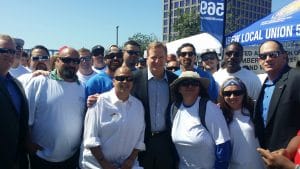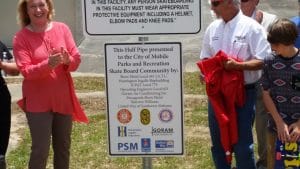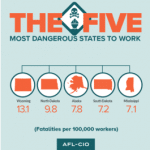
Orozco had married in 2012 and gave birth to her first natural child on February 17, 2015. The infant, born prematurely, had been scheduled to be released from the hospital the day after her mother was been shot.
Orozco not only left behind her infant daughter, but also her husband, two stepchildren and a devastated community within which she was lovingly known as Coach K after having spent time coaching young men and women as a baseball coach since 2009. She also served as a Girl Scout leader and Special Olympics volunteer.
Moved to make a memorial
Jefferson Davis, member of SM Local 3 in Omaha, NE, was so moved by the tragedy that the next day, he was inspired to create a metal badge to honor her memory. Within 24 hours he had collected all the needed material with help from his SM Local 3 Brothers and Sisters as well as from the Waldinger Corporation, a SM Local 3 signatory mechanical contractor. The efforts included locating the stainless steel, finding a place to perform the plasma cutting, and securing the equipment he needed to start the work.
Brother Davis worked on the badge straight through the weekend from noon on Friday until 1 a.m. in the morning Sunday. The badge was well received by Officer Orozco’s family and members of the Omaha police force.

A sheet metal worker for 21 years, Davis has only recently expanded his scope of work to include metal artwork. He has also built metal artwork that has been included in the local public gardens and park.
Davis and his wife, Nikki, recently opened up their own retail business in Woodbine, Nebraska called Heavy Metal Renaissance.
Author: paul

Other NFL teams from the Patriots to the Cowboys have benefited from the highly skilled Building Trades, especially SMART sheet metal members, and the Chargers committed to a Project Labor Agreement (PLA) for a new stadium.
Sheet Metal Local 206 (San Diego) and the area Building Trades are helping to collect 67,000 signatures to put the project on the November ballot, with a $1.8 billion stadium and a convention center annex that would host major conventions and special events.
Union members joined a “Signature Kick-Off” event, held adjacent to San Diego’s downtown baseball park on April 23. SM Local 206 Business Manager Doug Tracy was on stage to kick off the petition drive along with other labor leaders; Chargers personnel including former running back LaDainian Tomlinson, quarterback Phillip Rivers, President and CEO Dean Spanos, and Head Coach Mike McCoy; NFL Commissioner Roger Goodell; and Congressmen Scott Peters (D), Juan Vargus (D), and Darrell Issa (R).
As Tracy put it, “partnering with the Chargers will provide a clear path to building a world-class, multi-use facility that will not only retain our football team, but ensure we keep major events such as Comic-Con and college bowl games that bring revenue back to our city while keeping members employed.”
“The hours this will provide SMART members while ensuring the city has a facility that serves as an economic driver for years to come will be a win-win for everyone involved,” Tracy added.
Top Notch of Indiana recognized Sheet Metal Workers Local No. 20 with the Training Excellence Award during its seventh annual Standards of Excellence Awards program luncheon on May 19 at the Indianapolis Motor Speedway. The event honored select organizations that earned the highest level of distinction over the previous year in Indiana’s union construction industry.

Tim Myres, Local No. 20 training coordinator, attributed the local’s recognition to the cumulative effort of the many talented professionals on staff, and the hard work they put forth to be considered, and then honored, with the award. This is the first time Local No. 20’s Apprenticeship and Training Program has been recognized by Top Notch of Indiana.
During the last five years, instructors and staff have worked to upgrade and improve the apprenticeship and training program at Local No. 20. From reworking the curriculum, to preparing apprentices for the next 20, 30, or 40 years of their careers in the real world, it’s been a challenge, but one worth the undertaking, Myres said.
“We all have seen the positive outcome of their efforts, and this award makes it apparent that industry leaders across the state have observed all of their hard work and success as well,” he added.
Awards were presented in four categories, including Training Excellence, Union of the Year, Contractor of the Year and Labor/Management Foundation.
For additional information on the Top Notch Standards of Excellence Awards, visit www.topnotch.org.
This article originally appeared at Eye On Sheet Metal
For members across the United States, the Fourth of July is a time for a barbecue.
This list is from the AFL-CIO and comes courtesy of the Los Angeles County Federation of Labor’s website Labor 411; Union Plus; the Bakery, Confectionery, Tobacco Workers and Grain Millers (BCTGM); and the United Food and Commercial Workers (UFCW).
Beer
- Budweiser
- Coors
- Miller
- Pabst
- Sam Adams
See more beers from Union Plus.
Coolers
- Rubbermaid
Flags
- Artflag
Games
- Battleship
- Candy Land
- Clue
- Connect Four
- Monopoly
- Twister
- Yahtzee
Grills
- Weber (Genesis, Summit, Q Series)
Hot Dogs
- Ball Park
- Butterball
- Hebrew National
- Hormel
- Oscar Mayer
Ice Cream
- Breyers
- Good Humor
- Prairie Farms
- Tillamook
Snacks
- Flipz pretzels
- Frito-Lay chips
- Triscuit crackers
- Wheat Thins crackers
Sunscreen
- Bain de Soleil
- Coppertone
In Canada, a private member’s bill, supported by SMART and the Canadian Building and Construction Trades, has passed its first reading. The bill, C-292, would amend the Canadian Labour Code to require the Minister of Labour to maintain a registry containing information reported by employers about accidents, occupational diseases, and other hazardous occurrences.
This bill would require employers to report information about all accidents, occupational disease, and other hazardous occurrences known by the employer to the Minister of Employment, Workforce Development and Labour.
According to James Jackson, SMART Director of Canadian Affairs, “this bill will bring change that positively impacts workers by giving them access to information about hazards they are exposed to at work. This has been a long time coming.”

On June 10, a federal appeals court sided with the National Labor Relations Board (NLRB) rule which speeds up the union election process. The Fifth Circuit Court of Appeals ruled that the NLRB did not exceed its authority in issuing the rule.
The NLRB, in its original ruling, held that employees can vote on union representation 11 days after a petition for representation is filed.
The election rule was being challenged by the Associated Builders and Contractors (ABC) and the National Federation of Independent Business (NFIB). These anti-worker groups and their supporters claimed that it limits an employer’s ability to contest voter eligibility and pre-election hearings. The groups also argue that sections of the rule violate federal privacy laws. The Fifth Circuit, arguably the most conservative federal court in the nation, did not agree.
The SMART Mechanical/BMWED coalition held negotiations on Tuesday, May 24, 2016, with the National Carriers’ Conference Committee (NCCC) at Norfolk Southern’s corporate office in Atlanta, Georgia.
SMART Mechanical/BMWED expert economist, Tom Roth, gave an in depth presentation regarding the “Big Four” Class 1 freight railroads’ financial status. In summary, the demand for coal has been reduced on account of a glut of cheaper natural gas derived by fracking, coupled with a lessening of world demands for coal, particularly from China. Consequently, Burlington Northern Santa Fe, CSX, Norfolk Southern and Union Pacific have experienced decreased volumes of coal shipped by rail. However, the railroads have been able to adapt their business model by fulfilling other shipping demands to moderate their losses in coal volume. He also observed that while 2015 revenue was a little off from the peak year of 2014, the railroads were still doing comparatively well and have been enjoying a historically prosperous run for over a decade. The concluding remark of economist Roth was that the current financial and economic environments for the “Big Four” railroads are better than the last two rounds of national negotiations, even though 2016 will continue to see some structural readjustments in railroad operations.
The NCCC had no immediate comments regarding the presentation but did note that they desired to analyze the information and requested the sources of Roth’s presentation. They further noted that they would provide a presentation regarding their position on the freight railroads’ financial status at an unspecified future date.
Further negotiations are scheduled for the end of July 2016 as well as during September 2016. Although negotiations are proceeding slowly, we believe that the SMART Mechanical/BMWED initiatives on healthcare will assist the parties in reaching a voluntary agreement. SMART Mechanical & Engineering Department members are represented by Chairman Joe Fraley.

In 2014, 4,821 workers died on the job and an estimated 50,000 died from occupational disease. That is 150 workers per day due to hazardous working conditions. Just over a third of all workplace fatalities happened to workers between the ages of 55 and 65, and workers 65 and older have three times the risk as other workers.
The trend of Latino workers facing more dangerous conditions also continued in 2014, when 804 Latino workers died on the job, of which 64 percent were immigrant workers.

In this unusual political year, so much has already happened that it can be hard to remember we are still several months away from the November 8 General Election.
As a Union and as individual voters, our task is to look beyond all the “breaking news” and stay focused on what really matters—our Union issues, the common concerns that should drive our votes.
These are the same things that our prior generations have talked about, that my father talked about at our dinner table 30 and 40 years ago, and our recent member survey confirmed it. Members give the highest emphasis to the pragmatic issues at the heart of working life and trade unionism: Jobs and hours; wages and benefits; secure retirement; representation and respect for workers and contracts; organizing to add employers and members.
This is Unionism: the needs we have in common, the things that unite us. For ourselves, our families, and our Union, we must stay united as Union members to wield our strongest collective voice as we pursue those basic interests in the workplace, at the bargaining table, and in elections at all levels.
Union to the core
This issue of The Members’ Journal focuses on those central union matters, from the political news to the special focus section on pages 16–24. There are two broad themes.
First is organizing and strategies, starting with the many efforts to add members and employers so we continually gain strength in each shop, each market, and each industry. It means working with “Jobs to Move America” to build plants under PLAs where rail cars will be built Union, too. It is lobbying to defeat anti-union legislation like our Brothers and Sisters did in New Mexico.
Organizing and strategies include the many ways we build our strength and our power.
The other broad term is contracts, which fix our hard-earned wages and benefits, define our workplaces, and support the steadfast negotiation and representation that brings our shared potential to individual members.
Success on those issues involves us taking a stand for each other, in solidarity. There is no better example than Local 66 members who are nine months into a stand at North shore Sheet Metal in Western Washington. Their struggle is to ensure that our core values are not compromised through negotiations and to protect those values across our industry. Local 66 needs our support!
Contracts are a process and its results, the concrete Union gains that we negotiate and protect with our considerable strength and power.
What those two broad areas have in common is that they rely on our collective strength and concerted action. They rely on solidarity. On focusing our efforts. On standing together as a Union.
The timeless slogan says it all: United we bargain. Divided we beg.
Unity matters
Make no mistake, elections involve all of these elements, too. We organize volunteers and voters to elect pro-union candidates. Our strategic political action is part of democracy’s “contract” in which voters support candidates who support their issues and programs.
This Fall, when we’re (probably) down to one candidate from each of the major parties, those common issues for all working people must be the driving force in our individual and collective efforts. Yes, there will be a lot of action between now and Election Day. As voters and volunteers, if we stick with the issues, the choice will be clear: a proven friend of labor or an anti-union demagogue.
On our side, where the fight is for a White House that will address our bread-and-butter concerns, we will have someone we can work with.
When the crucial home stretch arrives, we must be ready to work and vote for the pro-worker side. We will unite to elect a President (and Congress) who side with Labor and with our most basic concerns.
Our role this Fall will be strategic—and highly visible: educating our members and other voters and building support for our candidates up and down the ticket. In turn, those who we help to elect will have the core principles of working families clearly in mind when they take office and fulfill their role: creating jobs and investments and policies that will help members of SMART and of other unions as well.
Standing united with the house of Labor, we will turn out to bring in a new President—and a new day for working families in America.
Fraternally
Joseph Sellers, Jr.
General President
